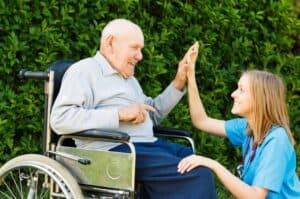
8 Memory Care Requirements That You Need to Consider Before Committing Your Loved One
Have you noticed a decline in cognitive and memory abilities as your loved one ages? In some individuals, this decline can be more pronounced, resulting
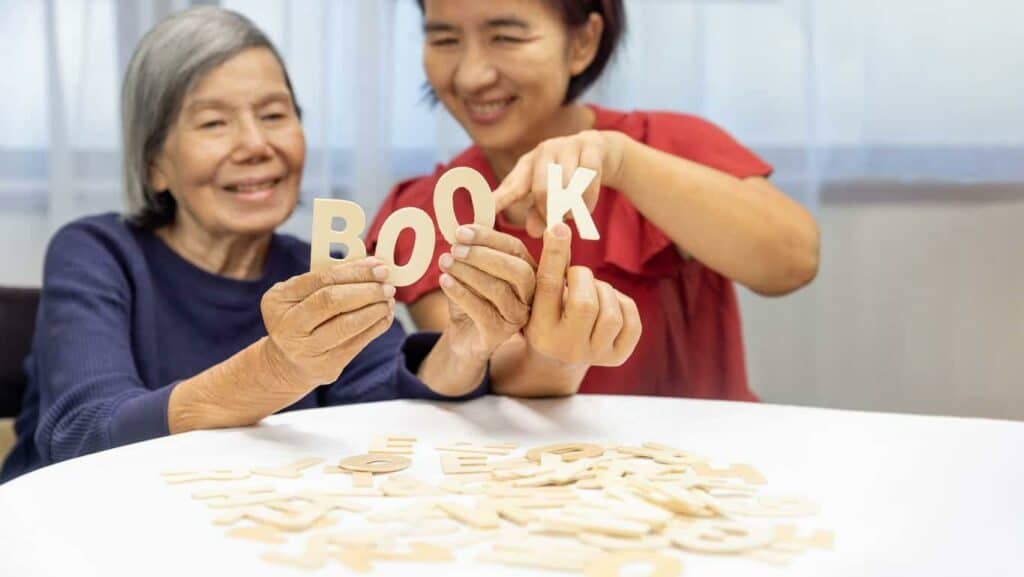
Do you know patient teaching can transform the lives of those affected by this overwhelming disease known as Dementia?
In this article, we are going to discuss patient teaching in the context of dementia, different teaching strategies, and how it significantly impacts the lives of dementia caregivers and patients.
Dementia is a general term used to describe a decline in cognitive ability and memory of older people that is severe enough to interfere with their daily functioning and quality of life. It is not a specific disease, but rather a set of symptoms associated with various underlying conditions.
Dementia is characterized by impairments in thinking, memory, communication, and the ability to carry out daily activities. It can affect multiple cognitive domains, such as memory, attention, language, problem-solving, and visual perception. It is typically progressive. The symptoms worsen over time and can have a significant impact on seniors and their families.
Dementia has several types; each with its own characteristic symptoms and causes. Some common types of dementia include:
This is the most common form of dementia that accounts for 60-70% of cases. It is characterized by the accumulation of amyloid plaques and neurofibrillary tangles in the brain, leading to the progressive loss of memory and cognitive function.
This type is caused by reduced blood flow to the brain due to small strokes or damaged blood vessels. The symptoms may appear suddenly or progress gradually depending on the severity and location of the brain damage.
Lewy bodies are abnormal protein deposits that develop in the brain, leading to cognitive decline, visual hallucinations, and problems with movement. A person with Lewy body dementia may also experience fluctuations in attention and alertness.
This type of dementia primarily affects the front and sides of the brain, leading to changes in behavior, personality, and language skills. It typically occurs at a younger age compared to other types of dementia that affect elderly people.
Dementia can have various causes, and in some cases, the exact cause may not be known. However, there are several common factors associated with the development of dementia:
Advanced age is the most significant risk factor for dementia. As individuals grow older, the risk of developing dementia increases.
Certain genetic factors can increase the likelihood of developing certain types of dementia. For example, specific gene mutations are associated with early-onset Alzheimer’s disease.
Severe head injuries or repeated concussions can increase the risk of developing dementia later in life.
Conditions such as cardiovascular disease, diabetes, and hypertension can contribute to the development of vascular dementia.
Unhealthy lifestyle choices, such as smoking, excessive alcohol consumption, poor diet, and lack of physical and mental activity, may increase the risk of dementia.
The symptoms of dementia can vary depending on the type and stage of the condition. However, some common signs and symptoms include:
Dementia is a progressive condition. The symptoms generally worsen over time. The rate of progression varies depending on the patient and the type of dementia they have.
In the early stages, they may experience mild cognitive impairments, which gradually worsen and start interfering with their daily activities. As dementia progresses, they may require increasing levels of care and support to manage their symptoms and maintain their quality of life.
Early detection and diagnosis of dementia are crucial for several reasons. Firstly, it allows elderly patients and their families to plan for the future, make important decisions about care preferences, and access available support services.
Secondly, certain types of dementia may have treatable causes or underlying conditions. If they are identified early, they can be managed or even reversed. Early intervention and treatment can be helpful in slowing down the progression of symptoms.
Early detection also provides an opportunity to explore available treatment options and make necessary adjustments to maintain a fulfilling life despite the challenges posed by dementia.
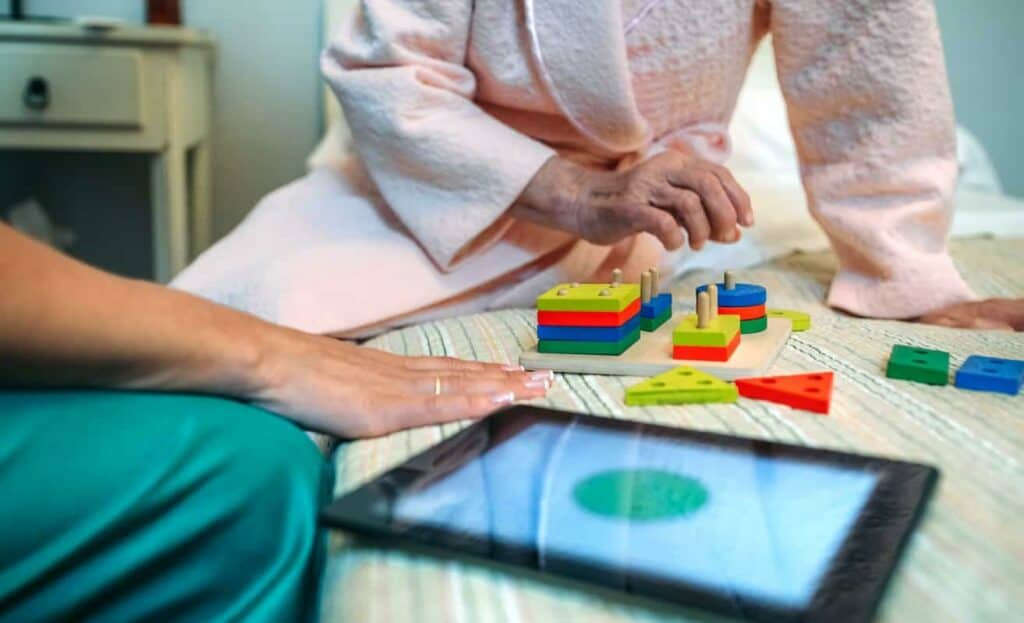
When it comes to caring for seniors with dementia, patient teaching becomes an essential component of their overall care plan. Let’s take a deeper look at patient teaching and why it is important for seniors.
Patient teaching involves educating the patient about their condition, signs, symptoms, progression, management options, and self-care strategies. It involves clear and concise communication, repetition, and the use of visual aids to enhance understanding and retention of information. Patient teaching helps the patient learn how they can cope with their disease.
In the context of dementia care, patient teaching is particularly important as it enhances the elderly’s independence, improves their quality of life, and reduces caregiver burden.
Patient teaching empowers patients by providing them with knowledge and skills to make informed decisions about their care. By understanding their condition, they can actively participate in managing their symptoms and daily activities. This sense of empowerment also promotes independence and boosts their confidence, leading to a greater sense of control over their lives.
Patient education also contributes to enhancing the quality of life for patients. It helps them better understand and cope with the challenges they may face. Teaching techniques and strategies for memory retention and cognitive stimulation can improve cognitive function, preserve abilities, and delay the progression of progressive diseases like dementia. Educating patients about engagement in meaningful activities can foster a sense of purpose, hence positively impacting their overall well-being.
Patient teaching plays a crucial role in improving communication between patients and their caregivers. Educating patients about their condition can help them better communicate their needs, preferences, and concerns. This, in turn, reduces frustration and confusion, leading to more meaningful and productive interactions. When patients are equipped with the knowledge and skills to participate in their own care, it alleviates some of the caregiver burden, resulting in a more balanced caregiving relationship.
Senior caregivers play a vital role in the patient teaching of elderly with dementia. Their involvement facilitates communication, provides personalized instruction, and offers emotional support, significantly contributing to the effectiveness of patient teaching.
Here are key ways in which senior caregivers play their role in patient education for Alzheimer’s disease:
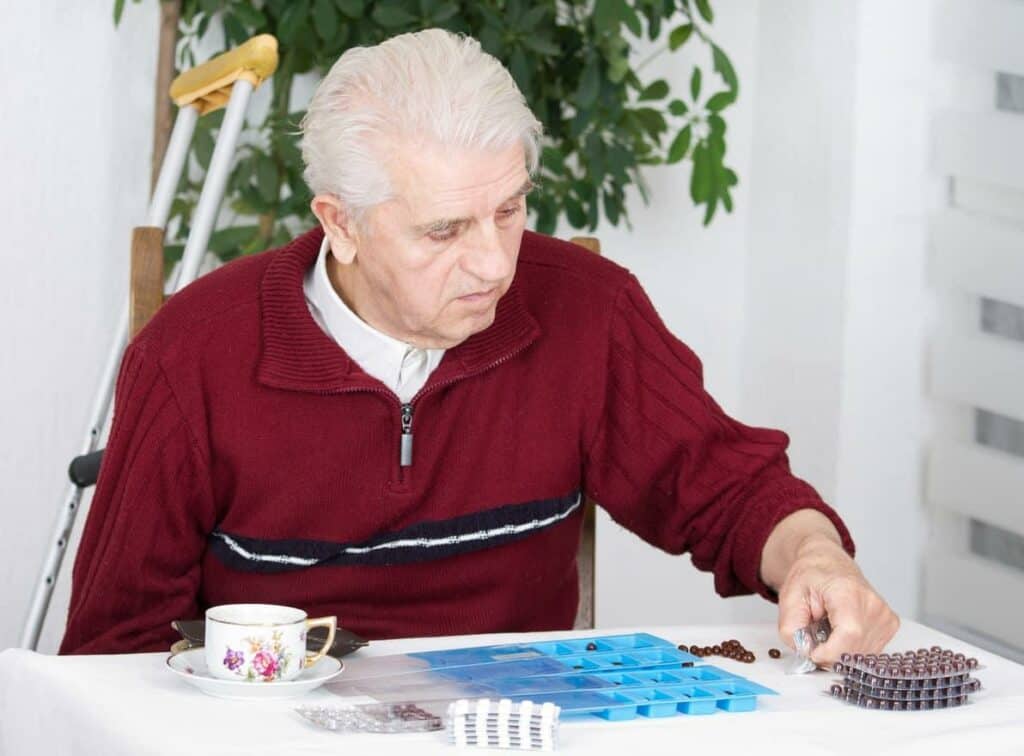
Effective patient teaching involves providing information, support, and practical strategies to both patients and their caregivers. By addressing key components of patient teaching for dementia, you can empower patients and their loved ones to navigate the challenges associated with the disease.
We have discussed some essential elements of patient teaching for dementia and strategies to optimize care.
One of the essential components of patient teaching is educating patients and their caregivers about dementia to develop understanding and acceptance. Explain to them the nature of dementia, its progression, and its impact on their cognitive function. Provide information about different types of dementia, their respective symptoms, and progression patterns in simple, layman’s terms and avoid medical jargon. Explain to them how dementia is not a normal part of aging but a neurological condition that requires long-term support.
It is important to discuss the potential causes and risk factors associated with dementia in elderly patients. Elaborate on the role of age, genetics, lifestyle factors, and comorbidities. Explain that while some risk factors are beyond control, the overall risk of developing dementia can be reduced by adopting a healthy lifestyle.
Describe the common symptoms of dementia, such as memory loss, confusion, speech difficulty, and changes in mood and behavior. Provide easy-to-learn strategies for managing these symptoms, including engaging in cognitive exercises and managing emotional well-being through social activities and relaxation techniques. Explain how medication adherence and constant support are going to help in slowing down the disease progression.
Some key strategies to help patients manage daily activities despite cognitive challenges.
It is important to recognize that every Alzheimer’s patient is unique, and their care should be tailored to their individual needs. Here are three common approaches to customize client education for Alzheimer’s disease:
You should ensure the safety and health of individuals with dementia by addressing potential hazards and implementing risk management strategies.

Patient education for Alzheimer’s disease is challenging due to various factors like cognitive impairment, communication difficulties, behavioral symptoms, and the progressive nature of the disease. These factors require tailored approaches, effective communication strategies, and caregiver support to overcome these challenges and provide successful dementia teaching.
Here we have discussed how to overcome three common challenges in Dementia patients:
Some Alzheimer’s patients may be in denial about their condition. They may find it hard to accept the news of their diagnosis and acknowledge the need for support. It is important to overcome this challenge to have a successful patient teaching experience.
Build their trust in you and create a supportive environment by showing empathy towards them and actively listening to their concerns. When you validate their emotions and concerns, you gradually foster acceptance and prepare them for effective teaching.
Adapt to the patient’s cognitive needs to improve their comprehension and engagement. Introduce visual aids, simplified language, and repetition to facilitate understanding and overcome resistance.
It is essential to involve family members and caregivers in the teaching process to provide a strong support system. Educate them about the disease and its progression so they can reinforce the information with the patient and support their acceptance of the diagnosis.
Communication difficulties are common in Alzheimer’s patients due to language impairments, memory loss, and cognitive decline. These challenges can slow down or hinder patient teaching efforts. However, with certain strategies, they can be overcome.
Simplify your ways of communication according to the patient’s needs. Use simple, clear language, maintain eye contact, and speak at a calm and moderate pace. Break down complex concepts into smaller, manageable pieces so they can easily comprehend and retain information.
Introduce non-verbal cues such as gestures and facial expressions to facilitate verbal communication. Visual aids, such as charts, pictures, and diagrams, also help in conveying information effectively.
Allow dementia patients sufficient time to process and respond, and don’t rush them. Answer all their questions. Patience and active listening, along with non-judgmental attitudes, help create a safe space for communication and understanding.
Patients with Alzheimer’s also exhibit emotional reactions, aggressiveness, and distress while learning about their condition and the presenting challenges. You need to cautiously handle the situation to help them instead of aggravating the symptoms.
Provide emotional support and constant reassurance. Acknowledge and validate their emotions to help alleviate distress and create a sense of safety.
Introduce coping mechanisms, such as deep breathing, meditation, or calming exercises. These activities help patients regulate their emotions and reduce anxiety.
Connect patients with support groups or resources for individuals with Alzheimer’s to provide them with a sense of community and understanding. These platforms offer the elderly opportunities to share experiences and learn from other patients facing similar challenges.

Caring for dementia patients is a demanding role. Caregivers who are dedicating themselves to this important task also require adequate support and resources. It is crucial to recognize and address the unique needs of caregivers who provide tailored care to dementia patients. These caregivers play a vital role in ensuring the well-being and quality of life of the elderly with dementia.
Let’s explore some of the key avenues of support that help caregivers provide the best care possible while maintaining their own well-being.
Caregivers of dementia patients often face unique challenges. Specialized knowledge and guidance are required by them to provide the best care. Online resources and educational materials provide valuable information and support. Websites, forums, and online communities dedicated to dementia caregiving offer a wealth of resources, including articles, videos, and downloadable guides.
These platforms help caregivers understand the progression of dementia, learn about effective caregiving techniques, and access tips for managing behavioral changes. Online forums also allow caregivers to connect with peers dealing with similar patients, hence facilitating the sharing of experiences and advice.
It takes specific skills and expertise to look after dementia patients. Training programs designed for dementia caregivers provide valuable knowledge and practical guidance. Skill development training can enhance caregivers’ abilities to provide appropriate care, improve their confidence, and ultimately enhance the quality of life for both the caregiver and the dementia patient.
These programs may be offered by local healthcare organizations, community centers, or dementia care facilities. They cover topics such as communication strategies, understanding of behavioral symptoms, and adherence to medications.
Caregiving of Alzheimer’s patients is physically and emotionally taxing and caregivers often face burnout or exhaustion. Respite care services offer caregivers temporary relief by providing substitute caregivers who can take over their responsibilities for a short period. This allows them to take a break, rest, and recharge.
Respite care can be arranged at home or at senior care facilities that cater to individuals with dementia. Caregivers need to prioritize their own well-being and seek respite care whenever needed. Only then they would be able to provide the best care for seniors with dementia.
Caregiver Burnout is very common among caregivers, particularly those who care for seniors with diseases like Alzheimer’s, Parkinson’s, etc. Caregivers must prioritize self-care to maintain their own physical and mental well-being. They can engage in regular exercise, maintain a balanced diet, get sufficient sleep, and seek emotional support through peer support groups.
Taking breaks, practicing relaxation techniques, such as meditation, and pursuing hobbies that bring joy can also help them cope with burnout. They should not hesitate to ask for help and should consider seeking professional guidance and support when needed.
Many organizations are dedicated to supporting caregivers of dementia patients. These organizations provide a range of services, including information resources, helplines, professional counseling services, and support groups. Support groups can be particularly valuable, as they allow caregivers to connect with their peers who are going through similar experiences.
Sharing experiences, exchanging advice, and receiving emotional support from fellow caregivers who understand the challenges can be immensely beneficial. It makes them feel less isolated, provides a sense of belonging, and offers practical assistance in navigating the caregiving journey.
Local communities often have resources available to assist caregivers. Community centers, senior centers, or local government agencies may offer programs and services to support caregivers.
These resources may include educational workshops, support groups, respite care services, transportation assistance, and access to social workers or case managers who can provide guidance and referrals. Caregivers should also reach out to their community resources to explore the available support options.

Client education for Alzheimer’s disease has a significant role in dealing with the progression of the disease and the patient’s attitude towards it. With practical strategies and teaching methods, caregivers can create a meaningful environment for elderly patients.
Due to cognitive decline in the elderly due to dementia, they can be hard to work with. But caregivers can use empathy and communication-driven strategies to gain their confidence. Such progressive diseases in the elderly prove to be exhausting for caregivers as well. However, there are support groups and resources that can help them maintain their well-being.
At Amy’s Eden, we not only ensure effective patient teaching for our elderly with dementia, but we also focus on our caregivers’ well-being. So, they can provide the best care to your loved ones. Contact us right away to discuss more about our caregiving services.
Get care >

Have you noticed a decline in cognitive and memory abilities as your loved one ages? In some individuals, this decline can be more pronounced, resulting

When we think about healthcare for seniors, we might not think of sports therapists. They usually work with athletes and help them stay fit. However,
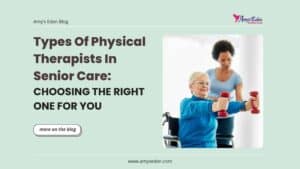
Are you considering physical therapy as a career option? Sometimes, you may or may not know what to expect once you become a certified physical
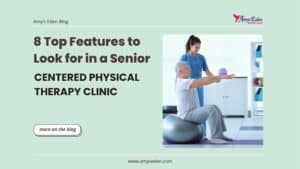
Do you find it harder to move around like you used to? Is chronic pain affecting your daily activities and overall quality of life? Do
